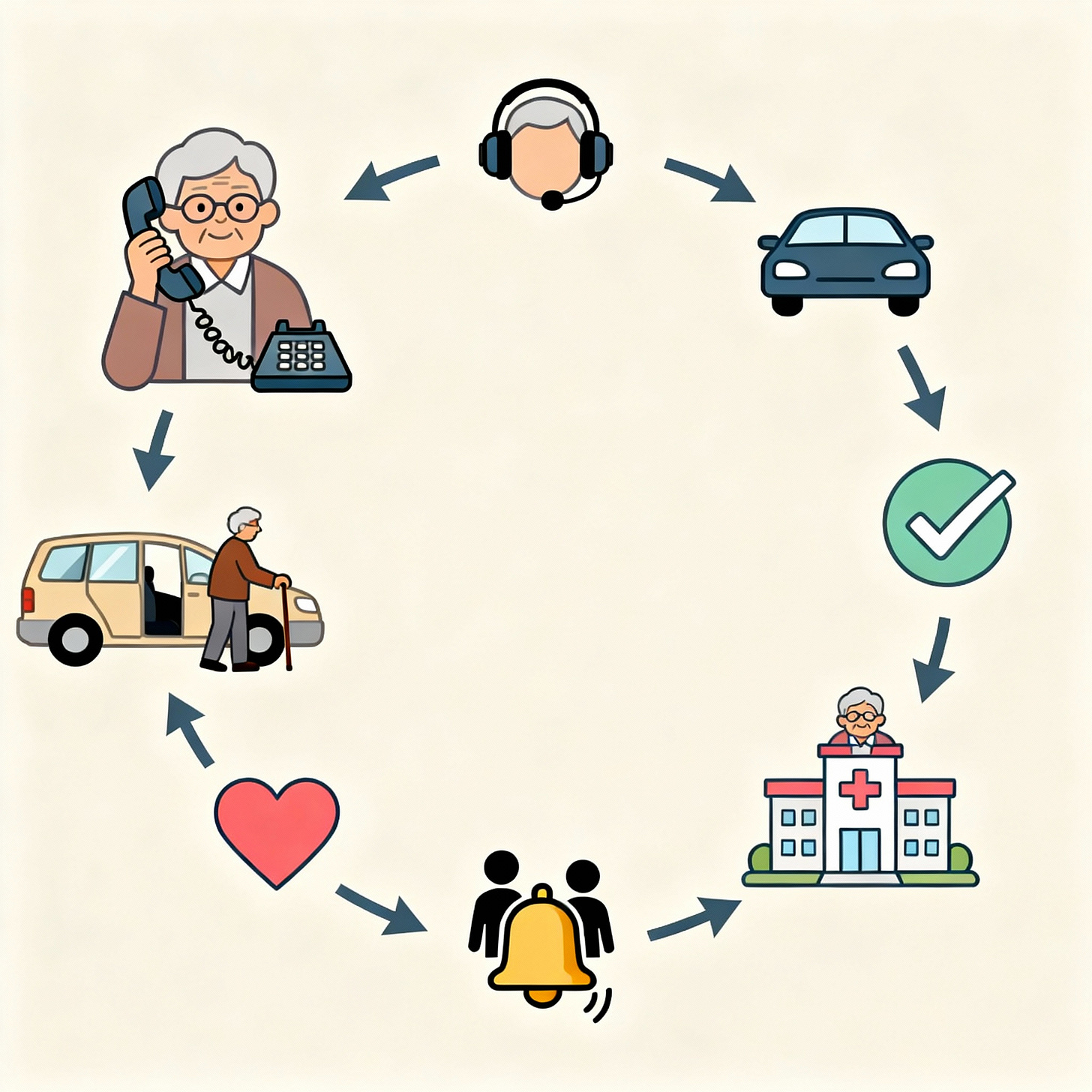Breaking Down Barriers To Transportation
How GoGoGrandparent Is Revolutionizing Senior Mobility
Modern ridesharing apps like Uber and Lyft have transformed how millions of people get around, but there’s a catch—58% of seniors don’t own a smartphone, and among those who do, more than half have never downloaded an app. This digital gap has created a transportation crisis for older adults who need mobility services the most. GoGoGrandparent is bridging this divide by making transportation accessible without requiring smartphones or technical expertise.
The Core Problems These Services Solve
The Smartphone Barrier
Traditional ridesharing services require downloading apps, creating accounts, and managing digital payments—tasks that create significant obstacles for many seniors. Even older adults who own smartphones often struggle with small buttons, unclear instructions, and frequent app updates that constantly change how things work. This technological barrier leaves a huge portion of the senior population unable to access services that could maintain their independence.
The consequences extend beyond inconvenience. Without reliable transportation, seniors miss medical appointments, skip grocery shopping, and lose opportunities for social interaction—all factors that contribute to isolation and declining health.
Safety and Monitoring Concerns
Beyond the initial booking challenge, traditional rideshare services assume users can react quickly to app alerts, track drivers in real-time, and handle split-second decisions. Aging can slow reaction times and affect memory and focus, making it difficult for seniors to notice if a driver cancels, arrives at the wrong location, or if they’ve accidentally entered the wrong vehicle. These aren’t rare scenarios—they’re common situations that can lead to confusion, frustration, or even dangerous outcomes.
How GoGoGrandparent Addresses These Challenges
GoGoGrandparent represents a fundamental shift in thinking about senior transportation. Instead of forcing older adults to adapt to technology, the service meets them where they are.
Phone-Based Access Without Apps
The service eliminates the smartphone requirement. Seniors can call a toll-free number (1-855-464-6872) using a landline, flip phone, or even have a family member place the call on their behalf. Users can request rides through touchtone options or by speaking directly with an operator—no apps, downloads, or technical knowledge required.
Once registered, the process is remarkably simple. A senior can call and say “Get me a ride to the doctor,” and GoGoGrandparent handles all the technical details behind the scenes, arranging transportation through partners like Uber and Lyft.
24/7 Human Monitoring and Support
GoGoGrandparent’s most distinctive feature is its comprehensive ride monitoring system. Their call center actively watches every trip in real-time. If a driver gets delayed, cancels, or goes to the wrong pickup location, GoGo’s team intervenes immediately to resolve the problem. They communicate special needs to drivers, contact riders when necessary, and can alert family members if issues arise.
This human oversight layer transforms ridesharing from a potentially stressful experience into a reliable, safe option. The service provides what seniors need most: support throughout the entire transportation process, not just at the booking stage.
Beyond Basic Transportation
GoGoGrandparent has expanded beyond rides to address multiple aspects of senior independence. The service now facilitates grocery delivery through partnerships with local stores, meal delivery via DoorDash, prescription delivery, and even home services like housekeeping and handyman tasks. This comprehensive approach recognizes that mobility limitations affect many areas of daily life.
The Broader Impact on Senior Independence
Transportation services designed for non-app users solve a fundamental equity issue. The digital divide disproportionately affects older adults, particularly those on fixed incomes in urban areas. When essential services shift entirely to digital platforms, seniors without smartphone access or digital literacy face functional impairment and increased isolation.
Age-friendly transportation platforms restore autonomy and freedom. They allow seniors who can no longer safely drive to maintain social connections, attend medical appointments, and participate in their communities. For many families, these services are transformative—they provide peace of mind while helping older loved ones maintain dignity and independence.
Technology Meets Compassion
The success of services like GoGoGrandparent demonstrates an important principle: accessible design doesn’t mean dumbed-down technology. It means thoughtful technology that accommodates different abilities, comfort levels, and life experiences. By creating an interface seniors actually use—the telephone—and pairing it with human monitoring, these services leverage modern ridesharing networks while removing digital barriers.
The model also benefits families. Loved ones can be added to accounts to receive ride updates and alerts, providing transparency and security. Custom preferences allow seniors to request drivers comfortable with providing assistance or to avoid locations with stairs.
Looking Forward
As ridesharing continues to evolve, accessibility must remain a priority. Recent efforts by major platforms to simplify their apps for seniors are steps in the right direction. However, intermediary services that eliminate app requirements will remain essential for the significant portion of older adults who cannot or prefer not to use smartphones.
Transportation is about more than moving from point A to point B—it’s about freedom, dignity, and the ability to live independently. Services designed specifically for seniors acknowledge this reality and provide solutions that work for real people, not just ideal users.
For older adults and their families seeking accessible transportation options, GoGo Grandparent can be reached at 1-855-464-6872, demonstrating that sometimes the most advanced solution is simply meeting people where they are.


